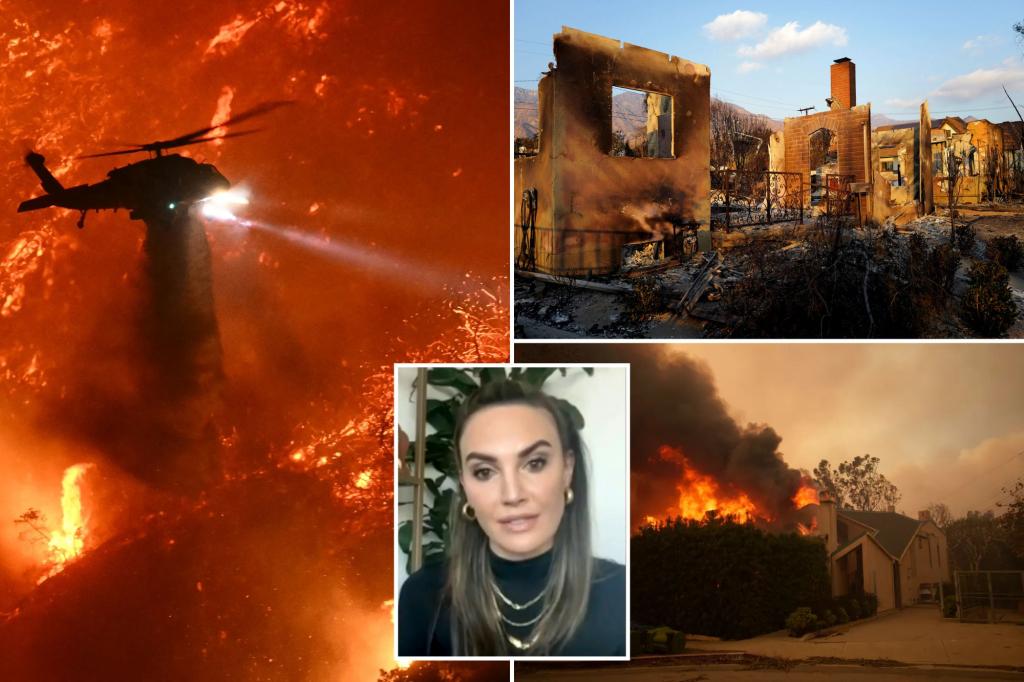The devastating wildfires that recently ravaged Los Angeles have sparked a wave of criticism directed at the city’s preparedness and response efforts. Actress Elizabeth Chambers, among those forced to evacuate, voiced her strong disapproval, characterizing the situation as a “disaster” and asserting that authorities were ill-equipped to handle a crisis of this magnitude. She pointedly questioned the effectiveness of preemptive measures, highlighting the stark contrast between the untouched Palisades Village, owned by former mayoral candidate Rick Caruso, and the surrounding devastation. Chambers insinuated that Caruso’s property remained unscathed due to preferential treatment or superior individual preparation, raising questions about the equitable distribution of resources and support during the emergency. Her observations fueled the ongoing debate surrounding the city’s accountability and the adequacy of its disaster management protocols.
Chambers’ critique aligns with Caruso’s earlier condemnation of the city’s handling of the crisis. Caruso, who lost the mayoral race to Karen Bass, had publicly denounced the lack of water pressure in fire hydrants as “absolute mismanagement” by the city, emphasizing the critical role this played in the rapid spread of the fire and the resulting loss of property. This confluence of criticism from both a resident directly impacted by the fires and a prominent figure with experience in municipal affairs underscores a growing public perception of systemic shortcomings within the city’s emergency response framework. The widespread destruction and displacement caused by the fires have amplified calls for greater accountability and transparency in how the city prepares for and manages such disasters.
The human cost of the fires extends far beyond property damage. With the death toll rising to 27 and over 30 individuals still unaccounted for, the tragedy continues to unfold. Chambers, a mother of two, provided a glimpse into the personal upheaval experienced by countless families forced to flee their homes. She described the frantic process of gathering essential documents and cherished family photos, packing for what she initially believed would be a short evacuation. Her account underscores the emotional toll of such events, the uncertainty surrounding the safety of loved ones and the preservation of personal histories. The fires have not only disrupted lives but have also left a lingering sense of vulnerability and fear within the affected communities.
Chambers’ story also highlights the challenging task parents face in explaining such traumatic events to their children. She emphasized the importance of remaining calm and composed, acting as a reassuring presence amidst the chaos. She shared her approach of honest communication with her two young children, acknowledging the reality of the situation while offering reassurance and emphasizing the enduring strength of their family bond. This focus on emotional resilience and familial support reflects a broader community effort to help children process the trauma and fear associated with the fires. The experience serves as a reminder of the crucial role parents play in providing emotional stability and guidance during times of crisis.
Beyond personal experiences, the fires have also galvanized community-driven efforts to support those affected. Chambers herself has channeled her entrepreneurial spirit into fundraising for the victims through her bakery, Bird Bakery, by donating all proceeds from a specially designed “Cupcake for a Cause” to the Los Angeles Fire Department Foundation. This initiative not only provides much-needed financial assistance but also fosters a sense of collective responsibility and community solidarity. The choice of strawberry lemonade as the featured flavor carries symbolic weight, referencing California’s prominent strawberry industry and representing the community’s determination to transform adversity into something positive. This act of philanthropic entrepreneurship exemplifies the numerous ways individuals and businesses are contributing to the recovery efforts.
The Los Angeles fires have exposed critical vulnerabilities in the city’s disaster preparedness and response systems. From the lack of water pressure in fire hydrants to the perceived disparities in resource allocation, the event has prompted urgent calls for greater accountability and improved emergency management protocols. The personal accounts of those directly impacted, like Elizabeth Chambers, provide a poignant reminder of the human cost of such disasters, highlighting the emotional toll, the displacement of families and the ongoing struggle to rebuild lives. Amidst the devastation, however, the community’s resilience and spirit of collective action shine through, as individuals and businesses mobilize to support those in need and work towards a stronger, more prepared future. The fires serve as a stark reminder of the importance of proactive planning, equitable resource allocation and community-driven support in mitigating the impact of future disasters.

